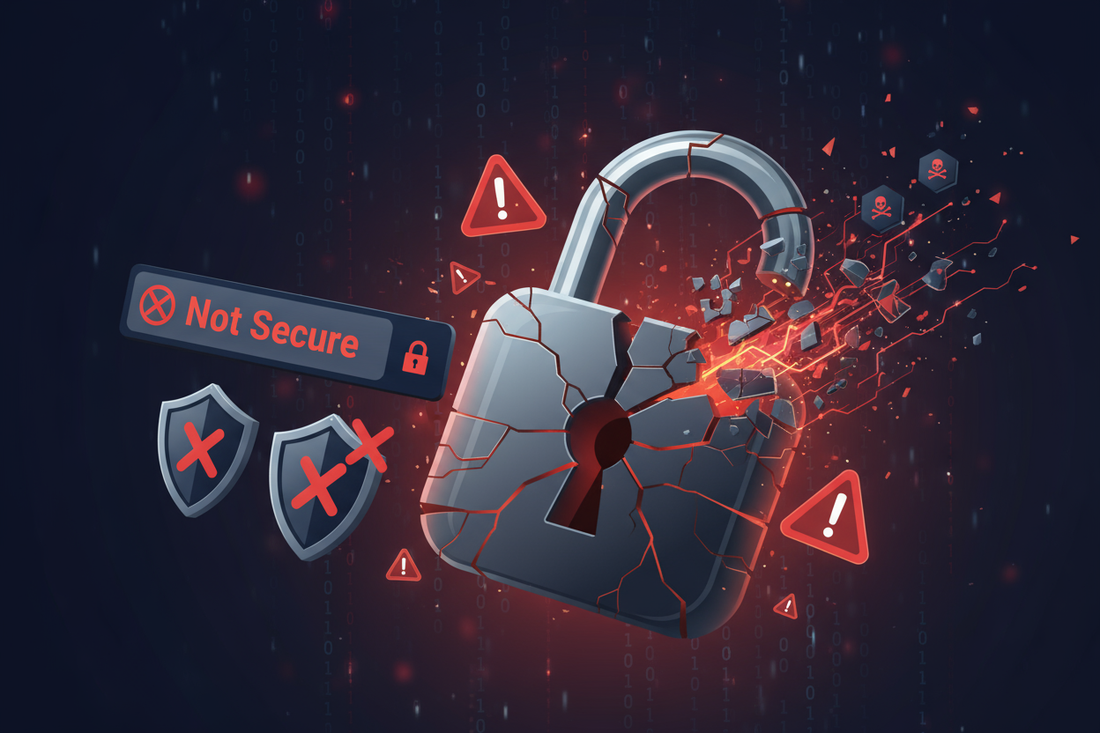
The Critical Risks of Expired SSL Certificates
Daniel MartinezShare
SSL Certificates serve as the backbone of secure communications for enterprise organizations worldwide. When these critical security components expire unexpectedly, the consequences can be catastrophic, resulting in service outages, revenue loss, and damaged customer trust.
Understanding the risks associated with expired SSL Certificates is essential for any organization that relies on secure digital communications and web services.
Trustico® SSL Certificates provide enterprise organizations with robust security solutions designed to prevent these costly disruptions. Our comprehensive portfolio includes both Trustico® branded and Sectigo® branded SSL Certificates, offering organizations the flexibility and reliability they need to maintain continuous secure operations.
The following analysis examines real-world cases where expired SSL Certificates have caused significant business disruptions and explores how proper SSL Certificate management can prevent such incidents.
Major Enterprise SSL Certificate Failures : Lessons from Industry Leaders
The telecommunications industry learned a harsh lesson in 2018 when Ericsson, a company handling approximately 40 percent of global mobile traffic, experienced a massive outage due to an expired SSL Certificate.
This incident affected millions of customers across Europe and Japan, demonstrating how a single expired SSL Certificate can cascade into worldwide service disruptions. The outage highlighted the critical importance of maintaining comprehensive SSL Certificate lifecycle management processes.
IT security experts were particularly surprised by this failure, given Ericsson size and technical expertise. The incident revealed a fundamental truth about SSL Certificate management : even the most sophisticated organizations can fall victim to expired SSL Certificates if they lack proper monitoring and renewal processes.
This case underscores why enterprises need reliable SSL Certificate providers like Trustico® that offer comprehensive management solutions alongside high-quality SSL Certificates.
The social media and professional networking sector faced similar challenges when LinkedIn experienced multiple SSL Certificate-related outages. In 2019, despite Microsoft acquisition and technical resources, LinkedIn suffered significant downtime when an SSL Certificate expired and was not properly updated on the server.
This wasn't an isolated incident, as LinkedIn had previously experienced similar SSL Certificate renewal oversights in 2017, affecting millions of users' ability to access their accounts.
Security researchers noted that while Certificate Authorities (CAs) provide renewal reminders, organizations often struggle with subdomain management and proper SSL Certificate deployment processes.
This highlights the value of working with experienced SSL Certificate providers like Trustico® that offer both technical expertise and comprehensive support throughout the SSL Certificate lifecycle.
The Impact on Business-Critical Applications and Services
Microsoft Teams, a platform essential for modern business collaboration, demonstrated how expired SSL Certificates can disrupt critical business operations.
In 2020, users worldwide faced several hours of service interruption when an authentication SSL Certificate expired, preventing the establishment of necessary HTTPS connections. This incident was particularly concerning given Microsoft use of advanced monitoring tools like System Center Operations Manager specifically designed to detect SSL Certificate expiration.
The Microsoft Teams outage illustrates how expired SSL Certificates can affect not just external-facing websites but also internal business applications and cloud services.
Organizations relying on these platforms for daily operations faced significant productivity losses, emphasizing the need for robust SSL Certificate management strategies that extend beyond simple website security to encompass all digital touchpoints.
Google Voice experienced a similar fate in February 2021 when an expired TLS Certificate prevented users from making Voice over Internet Protocol calls for four hours.
The root cause analysis revealed that SSL Certificate configuration updates had failed, causing the active SSL Certificate to expire inadvertently. Google engineers spent two hours investigating the issue before identifying the SSL Certificate expiration as the root cause, demonstrating how even minor SSL Certificate management oversights can lead to extended service disruptions.
These incidents highlight the critical importance of implementing comprehensive SSL Certificate monitoring and management solutions. Trustico® SSL Certificates come with expert support and guidance to help organizations establish proper SSL Certificate lifecycle management processes, reducing the risk of unexpected expirations and associated service disruptions.
Industry-Specific SSL Certificate Challenges and Consequences
The podcasting and media streaming industry faced significant challenges when Spotify Megaphone platform experienced an eight-hour outage due to a missed SSL Certificate renewal in 2022.
This incident prevented podcast listeners from accessing their favorite content and blocked publishers from managing their content through the Megaphone CMS. The extended duration of this outage caused lasting damage to user confidence and highlighted how SSL Certificate failures can affect both B2B and B2C operations simultaneously.
The Spotify incident demonstrates how expired SSL Certificates can create cascading effects across multiple user groups and business functions. Content creators lost revenue opportunities, listeners migrated to competing platforms, and the company reputation suffered long-term damage. This case emphasizes the importance of implementing automated SSL Certificate renewal processes and working with reliable SSL Certificate providers who understand the unique requirements of high-availability platforms.
Network infrastructure providers face particularly complex SSL Certificate management challenges, as demonstrated by Cisco 2023 incident affecting over 20,000 customers using vEdge SD-WAN appliances. The SSL Certificate expiration created a "time bomb" scenario where customers faced potential WAN connectivity failures, forcing many organizations to completely re-architect their network infrastructure to maintain operations.
This Cisco incident was not isolated, as the company had previously experienced SSL Certificate-related issues in 2018 affecting their VPN products. These repeated failures highlight how SSL Certificate management becomes increasingly complex in enterprise network environments where SSL Certificates are embedded within hardware and software systems. Trustico® SSL Certificates provide the reliability and support necessary to manage these complex enterprise deployments effectively.
Understanding the Business Impact of SSL Certificate Failures
When SSL Certificates expire unexpectedly, the immediate technical consequences are just the beginning of a broader business impact.
Organizations face direct revenue losses from service unavailability, customer support costs from handling user complaints, and potential regulatory compliance issues if secure communications are compromised.
The cumulative effect of these factors can result in financial losses that far exceed the cost of proper SSL Certificate management.
Customer trust represents perhaps the most significant long-term consequence of SSL Certificate failures. When users encounter SSL Certificate errors or cannot access services due to expired SSL Certificates, they often perceive these issues as security vulnerabilities or signs of poor technical management. This perception can lead to customer churn, negative reviews, and difficulty acquiring new customers, creating lasting damage to brand reputation.
Enterprise organizations also face internal operational challenges when SSL Certificates expire. IT teams must divert resources from planned projects to emergency SSL Certificate renewals and system recovery efforts.
These unplanned activities disrupt project timelines, increase operational costs, and can strain relationships between IT departments and business stakeholders who depend on reliable system availability.
The complexity of modern enterprise environments means that a single expired SSL Certificate can affect multiple systems and services. Organizations often discover additional dependencies during outage recovery, leading to extended downtime and increased recovery costs. This interconnection emphasizes the importance of comprehensive SSL Certificate inventory management and proactive renewal processes.
The Evolution of SSL Certificate Management Requirements
Modern enterprise environments have evolved significantly from simple website deployments to complex, interconnected systems spanning cloud services, mobile applications, IoT devices, and internal networks. Each of these components may require SSL Certificates, creating management challenges that traditional manual processes cannot adequately address. Organizations must adapt their SSL Certificate management strategies to accommodate these expanding requirements.
The trend toward shorter SSL Certificate validity periods adds another layer of complexity to enterprise SSL Certificate management. While shorter validity periods enhance security by limiting the impact of compromised SSL Certificates, they also increase the frequency of renewal activities and the potential for oversight. Organizations must implement more sophisticated monitoring and automation tools to manage these accelerated renewal cycles effectively.
Cloud-native architectures and micro-services deployments create additional SSL Certificate management challenges. These environments often involve hundreds or thousands of individual services, each potentially requiring its own SSL Certificate. Traditional manual management approaches become impossible at this scale, necessitating automated SSL Certificate lifecycle management solutions that can handle dynamic service creation and deployment patterns.
Trustico® SSL Certificates address these evolving requirements by providing both traditional and modern SSL Certificate solutions. Our portfolio includes options suitable for simple website deployments as well as complex enterprise environments requiring advanced SSL Certificate management capabilities.
Whether organizations need Trustico® branded SSL Certificates for standard applications or Sectigo® branded SSL Certificates for specialized requirements, we provide the expertise and support necessary for successful implementation.
Implementing Comprehensive SSL Certificate Lifecycle Management
Effective SSL Certificate lifecycle management begins with comprehensive inventory and discovery processes. Organizations must identify all systems, applications, and services that rely on SSL Certificates, including those that may not be immediately obvious such as internal APIs, development environments, and third-party integrations. This discovery phase forms the foundation for all subsequent management activities and helps prevent surprises when SSL Certificates approach expiration.
Automated monitoring and alerting systems represent critical components of modern SSL Certificate management strategies. These systems continuously track SSL Certificate status across all organizational assets, providing advance warning of approaching expirations and identifying potential configuration issues before they cause service disruptions. Effective monitoring solutions should provide multiple notification channels and escalation procedures to ensure that renewal activities receive appropriate attention.
SSL Certificate renewal automation reduces the risk of human error and ensures consistent renewal processes across all organizational SSL Certificates. Automated systems can handle routine renewals without manual intervention, freeing IT staff to focus on more strategic activities while ensuring that critical SSL Certificates never expire unexpectedly. However, automation must be carefully implemented and monitored to prevent configuration errors that could cause their own service disruptions.
Building Organizational Resilience Through Proper SSL Certificate Management
Organizational resilience in SSL Certificate management requires establishing clear roles and responsibilities for SSL Certificate lifecycle activities. Organizations should designate specific team members as SSL Certificate owners for different systems and applications, ensuring that renewal responsibilities are clearly assigned and understood. These assignments should include backup personnel to handle situations where primary owners are unavailable during critical renewal periods.
Documentation and process standardization help ensure consistent SSL Certificate management practices across different teams and systems. Organizations should maintain comprehensive records of all SSL Certificates, including installation locations, renewal procedures, and dependency relationships. Standardized processes reduce the likelihood of errors and enable efficient knowledge transfer when staff changes occur.
Regular testing and validation procedures help identify potential SSL Certificate issues before they cause service disruptions. Organizations should implement routine checks of SSL Certificate functionality, including validation of SSL Certificate chains, encryption strength, and proper configuration. These proactive measures can identify problems such as intermediate SSL Certificate issues or configuration errors that might not be apparent during normal operations.
Incident response planning for SSL Certificate failures helps organizations minimize the impact when problems do occur. Response plans should include procedures for emergency SSL Certificate procurement and installation, communication protocols for notifying stakeholders of service disruptions, and escalation procedures for engaging additional resources when needed. Well-prepared organizations can often resolve SSL Certificate issues quickly, minimizing business impact.
Choosing the Right SSL Certificate Provider for Enterprise Success
Selecting an appropriate SSL Certificate provider represents a critical decision that affects long-term organizational success in SSL Certificate management.
Enterprise organizations require providers who understand complex deployment requirements, offer comprehensive support services, and maintain the technical expertise necessary to address sophisticated SSL Certificate challenges. The provider selection process should evaluate not only SSL Certificate products but also the full range of services and support capabilities.
Trustico® SSL Certificates offer enterprise organizations the combination of high-quality SSL Certificate products and expert support services necessary for successful SSL Certificate management. Our team understands the unique challenges facing enterprise organizations and provides guidance throughout the entire SSL Certificate lifecycle, from initial planning and selection through deployment, management, and renewal processes.
The availability of both Trustico® branded and Sectigo® branded SSL Certificates provides organizations with flexibility in addressing different requirements and use cases. This diverse portfolio enables organizations to select the most appropriate SSL Certificate type for each application while maintaining consistent support and management processes across their entire SSL Certificate infrastructure.
Expert support services distinguish professional SSL Certificate providers from basic or "cheap" SSL Certificate vendors. Organizations benefit from access to technical specialists who can provide guidance on complex deployment scenarios, troubleshoot configuration issues, and recommend best practices for SSL Certificate management. This support becomes particularly valuable during emergency situations where rapid resolution is critical to minimizing business impact.
Future-Proofing Enterprise SSL Certificate Strategies
The SSL Certificate landscape continues to evolve with new security requirements, technological developments, and regulatory changes. Enterprise organizations must develop SSL Certificate strategies that can adapt to these changing conditions while maintaining operational stability and security effectiveness. Future-proofing requires balancing current operational needs with anticipated future requirements and technological trends.
Post-quantum cryptography represents one significant future consideration for SSL Certificate planning. As quantum computing capabilities advance, current encryption algorithms may become vulnerable to quantum attacks, necessitating migration to quantum-resistant cryptographic methods. Organizations should work with SSL Certificate providers who are actively preparing for this transition and can provide guidance on migration planning and implementation.
The continued trend toward automation and DevOps practices will likely increase the importance of API-driven SSL Certificate management capabilities. Organizations adopting continuous integration and deployment practices need SSL Certificate solutions that can integrate seamlessly with automated deployment pipelines and infrastructure-as-code approaches. This integration enables SSL Certificate provisioning and management to keep pace with rapid application development and deployment cycles.
Trustico® SSL Certificates provide enterprise organizations with the foundation for successful SSL Certificate management both today and in the future. Our commitment to staying current with industry developments and emerging technologies ensures that our customers have access to the latest SSL Certificate solutions and best practices. Whether organizations need immediate SSL Certificate deployment or long-term strategic planning support, Trustico® provides the expertise and resources necessary for success.
Conclusion : Protecting Your Enterprise from SSL Certificate Risks
The risks associated with expired SSL Certificates represent serious threats to enterprise operations, customer trust, and business continuity. As demonstrated by numerous high-profile incidents across different industries, even the most sophisticated organizations can fall victim to SSL Certificate management failures if they lack proper processes and support systems. The consequences of these failures extend far beyond technical inconveniences to include significant financial losses, reputation damage, and operational disruptions.
Successful SSL Certificate management requires a comprehensive approach that combines proper planning, automated monitoring and renewal processes, centralized management platforms, and expert support services. Organizations must treat SSL Certificate management as a critical business process rather than a routine technical task, ensuring that appropriate resources and attention are dedicated to maintaining secure communications infrastructure.
Trustico® SSL Certificates provide enterprise organizations with the tools, expertise, and support necessary to implement effective SSL Certificate management strategies. Our comprehensive portfolio of both Trustico® branded and Sectigo® branded SSL Certificates addresses diverse organizational requirements while maintaining consistent quality and support standards.
Partnering with Trustico® means organizations can minimize the risks associated with expired SSL Certificates and maintain the secure, reliable communications infrastructure that modern business operations demand.



